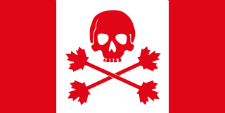-
chevron_right
Copyright Holders Intervene to Support Canadian Pirate Site Blocks in Court
Ernesto Van der Sar · news.movim.eu / TorrentFreak · Friday, 21 August, 2020 - 09:10 · 3 minutes
 Two years ago, Canadian broadcasting giants Groupe TVA, Bell, and Rogers took the relatively small pirate IPTV service GoldTV to court.
Two years ago, Canadian broadcasting giants Groupe TVA, Bell, and Rogers took the relatively small pirate IPTV service GoldTV to court.
What started as a simple copyright lawsuit soon became much more than that. With the pirate service failing to respond in court, the rightsholders requested an injunction to require local ISPs to block several related domain names.
This request met pushback from some ISPs but to no avail. Late 2018, Canada became the first North American country to require an ISP to block a pirate site or service .
Site Blocking Appeal
This blockade is still in place today but Internet provider TekSavvy has continued to object. The company filed an appeal at the Federal Court, which is ongoing. This raised the interest of several third parties, who all want to have their say in this important matter.
Earlier this month, the .CA domain registry and CIPPIC filed their interventions , arguing that blocking injunctions violate the Copyright Act and Telecoms Act.
On the other side of the spectrum, several copyright holders also asked the court to be heard. This request was approved under the condition that they would file a joint submission.
Copyright holders Intervene
TorrentFreak obtained a copy of the memorandum, submitted on behalf of the Premier League, Music Canada and the Publishers Association, among others. As expected, they back the blocking efforts.
In their submission, the copyright holders paint a grim picture of an Internet that’s full of illegal activity. This includes pirate sites and services that are nearly impossible to stop. Site blocking is one of the only options they have to counter the threat.
“Offenders operate under cloaks of anonymity, operating download and streaming sites and servers typically from outside Canada, flouting court orders, and undermining the rule of law. Voluntary takedown requests are ignored or deteriorate into a futile game of whack-a-mole,” the submission reads.
“Claimants have few if any direct means of enforcing court orders against such offenders. Blocking orders to be implemented by Internet service providers (‘ISPs’) are one of the only means available to disrupt these and other illegal business models.”
In isolation, these comments will do little to convince the court, but they represent just the introduction to a series of legal arguments. TekSavvy’s appeal challenges whether the court has jurisdiction over this matter, but the rightsholders believe that this critique is unwarranted.
The blocking order is in line with international treaty obligations, they counter. In addition, they don’t see the Copyright Act as a stumbling block either.
No Net Neutrality for ‘Unlawful’ Traffic
The same is true for net neutrality. Canada’s net neutrality policy doesn’t allow Internet providers to block domains or specific traffic types. However, the copyright holders note that this doesn’t apply to ‘unlawful’ traffic.
“Although the precise scope of net neutrality is not universally agreed upon or well-defined, it is clear that the international consensus is that it does not operate to
protect unlawful conduct.
“There is no basis to suggest that Canada has diverged in that respect from analogous jurisdictions,” the copyright holders write.
Copyright Trumps Freedom of Expression
Aside from the jurisdictional matters, TekSavvy and other interveners also raised concerns about freedom of expression, which is a human right. The copyright holders, for their part, counter that copyright is a human right as well.
They don’t believe that freedom of expression is at stake here, but even if it is, copyright would weigh stronger in this particular case.
“Even if free expression interests were engaged, which they are not, they would be outweighed in this case by the harm to expression from massive global piracy of creative industries.
“Courts around the world with strong freedom of speech rights have found that blocking orders do not violate those rights,” the intervention adds.
Based on these and other arguments the copyright holders ask the court to uphold the federal court ruling and keep the blocks in place. It is now up to the court to go over all submissions which will then lead to a final decision.
Whatever the outcome, the case is no longer just limited to the GoldTV service. It will determine if other ‘pirate’ sites and services can also be blocked in the future, which has the potential to impact millions of people.
—
A copy of the intervening memorandum of fact and law, submitted on behalf of the copyright holders, is available here (pdf) .
From: TF , for the latest news on copyright battles, piracy and more.


 Last year Canada’s Federal Court approved the
Last year Canada’s Federal Court approved the